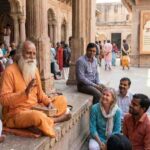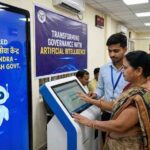Exploring How Tradition and Modernity Shape the State’s Pursuit of Fulfillment
Lucknow – In Uttar Pradesh, where ancient spiritual teachings and modern aspirations coexist, the understanding of happiness and contentment is undergoing a profound transformation. For centuries, the philosophies rooted in Vedic scriptures, Bhakti poetry, and Sufi teachings emphasized inner peace, simplicity, and spiritual growth as the essence of a fulfilled life. However, as modernization and economic development reshape the state, the pursuit of happiness is increasingly influenced by material progress, digital connectivity, and shifting societal values.
This evolution raises a critical question: Can Uttar Pradesh maintain its rich philosophical traditions while adapting to the demands of contemporary life?
Key Metrics Defining Happiness in Uttar Pradesh
- Economic Factors: The state contributes 8% to India’s GDP, yet 29% of its population lives below the poverty line, reflecting disparities in access to resources (NITI Aayog SDG Index 2023).
- Digital Connectivity: Over 50 lakh students have received digital devices under the Digi Shakti Program, highlighting increasing digital engagement (UP Government Report 2023).
- Mental Health Concerns: A 2022 study found that over 30% of young people in urban Uttar Pradesh reported experiencing stress or anxiety due to academic and career pressures (National Mental Health Survey).
- Cultural Engagement: Sites like Varanasi and Ayodhya continue to draw millions of pilgrims annually, showcasing enduring spiritual practices that emphasize inner fulfillment (UP Tourism Department, 2023).
Traditional Philosophies of Happiness in Uttar Pradesh
1. Vedic Teachings on Contentment
The Vedas and Upanishads advocate santosha (contentment) as a key virtue, emphasizing the importance of aligning one’s desires with spiritual goals rather than material pursuits.
- Application in Rural Life: For many rural communities, happiness is rooted in agricultural prosperity, family cohesion, and spiritual practices.
- Enduring Practices: Rituals like evening prayers and seasonal festivals continue to instill a sense of collective joy.
2. Bhakti and Sufi Traditions
The Bhakti and Sufi movements, which flourished in Uttar Pradesh, redefined happiness as a connection to the divine and a sense of unity with humanity.
- Cultural Influence: Saints like Kabir and Rahim emphasized love and devotion over wealth and status, promoting egalitarian ideals.
- Modern Reflection: Events at shrines like Bareilly’s Dargah Ala Hazrat celebrate shared joy through music, poetry, and communal harmony.
3. Gandhian Principles
Mahatma Gandhi’s emphasis on simple living and high thinking resonates in the state’s grassroots movements.
- Example: Self-help groups in rural areas, inspired by Gandhian ideals, promote economic self-sufficiency and collective well-being.
Modern Shifts in the Pursuit of Happiness
1. Rising Aspirations in Urban Centers
Cities like Lucknow, Noida, and Kanpur are witnessing a shift in happiness paradigms, with a growing emphasis on career success, material comfort, and digital lifestyles.
- Digital Influence: Social media has become a significant factor in shaping aspirations, particularly among the youth.
- Economic Drivers: Higher disposable incomes and increased access to consumer goods are redefining success and fulfillment.
2. Challenges in Balancing Tradition and Modernity
While modernization offers opportunities, it also brings stress, competition, and a sense of disconnection from traditional practices.
- Mental Health: The rise in anxiety and stress among young people highlights the need for emotional and spiritual balance.
3. Revival of Mindfulness Practices
In response to urban stress, there is a growing interest in yoga, meditation, and wellness retreats, particularly in spiritual hubs like Varanasi and Rishikesh.
- Government Initiatives: Programs promoting yoga and mental well-being reflect efforts to bridge ancient wisdom with contemporary needs.
Philosophical Insights for a Balanced Future
1. Reaffirming Inner Fulfillment
Teachings from Vedic and Bhakti traditions emphasize the need to prioritize emotional and spiritual well-being over material gain.
- Example: Educational programs incorporating mindfulness and value-based learning can help the youth navigate modern pressures.
2. Promoting Community-Centric Happiness
Rural traditions of collective celebrations and shared resources underscore the importance of fostering community bonds.
- Actionable Step: Encourage local festivals and cultural programs that bring communities together and reinforce shared values.
3. Integrating Tradition with Modern Wellness
The resurgence of yoga and meditation highlights the relevance of ancient practices in addressing modern challenges.
- Policy Recommendation: Expand access to wellness programs in schools, workplaces, and urban neighborhoods.
Challenges in Sustaining Philosophical Balance
- Economic Inequality: The gap between urban affluence and rural poverty continues to influence perceptions of happiness.
- Generational Divide: Younger populations often prioritize material success, while older generations value spiritual and familial contentment.
- Digital Overload: Excessive use of technology can contribute to stress and disrupt traditional practices that emphasize mindfulness and connection.
Conclusion
Uttar Pradesh stands at a crossroads where ancient philosophies of happiness and contentment meet the aspirations of a modernizing society. The state’s collective consciousness, shaped by Vedic teachings, Bhakti devotion, and Sufi inclusivity, offers timeless wisdom for navigating these changes.
As Uttar Pradesh evolves, its ability to harmonize traditional ideals with contemporary realities will define the future of happiness and contentment for its people, ensuring a balance between spiritual fulfillment and material success.













